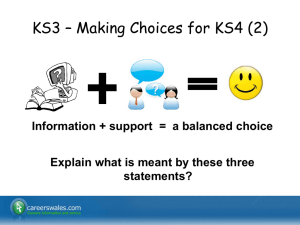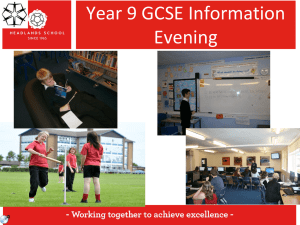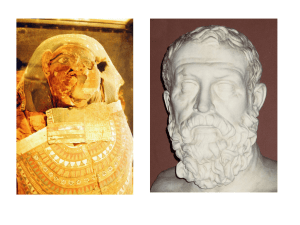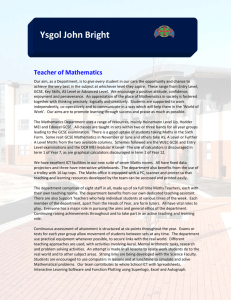level 2 subjects - Kingsmead School
advertisement
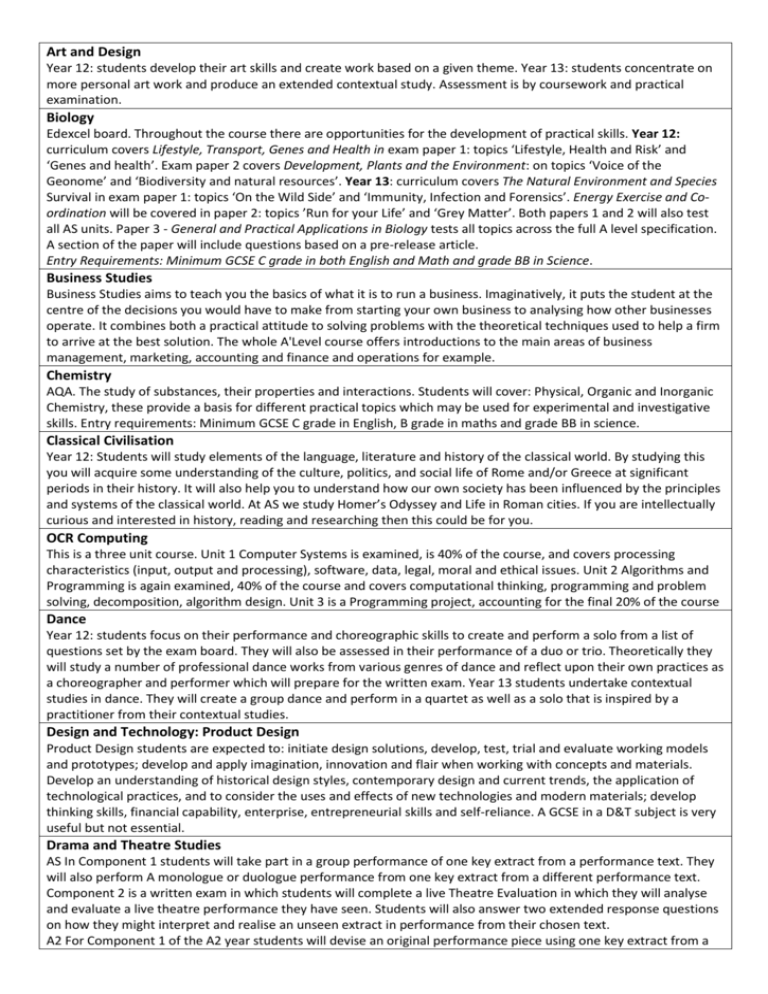
Art and Design Year 12: students develop their art skills and create work based on a given theme. Year 13: students concentrate on more personal art work and produce an extended contextual study. Assessment is by coursework and practical examination. Biology Edexcel board. Throughout the course there are opportunities for the development of practical skills. Year 12: curriculum covers Lifestyle, Transport, Genes and Health in exam paper 1: topics ‘Lifestyle, Health and Risk’ and ‘Genes and health’. Exam paper 2 covers Development, Plants and the Environment: on topics ‘Voice of the Geonome’ and ‘Biodiversity and natural resources’. Year 13: curriculum covers The Natural Environment and Species Survival in exam paper 1: topics ‘On the Wild Side’ and ‘Immunity, Infection and Forensics’. Energy Exercise and Coordination will be covered in paper 2: topics ’Run for your Life’ and ‘Grey Matter’. Both papers 1 and 2 will also test all AS units. Paper 3 - General and Practical Applications in Biology tests all topics across the full A level specification. A section of the paper will include questions based on a pre-release article. Entry Requirements: Minimum GCSE C grade in both English and Math and grade BB in Science. Business Studies Business Studies aims to teach you the basics of what it is to run a business. Imaginatively, it puts the student at the centre of the decisions you would have to make from starting your own business to analysing how other businesses operate. It combines both a practical attitude to solving problems with the theoretical techniques used to help a firm to arrive at the best solution. The whole A'Level course offers introductions to the main areas of business management, marketing, accounting and finance and operations for example. Chemistry AQA. The study of substances, their properties and interactions. Students will cover: Physical, Organic and Inorganic Chemistry, these provide a basis for different practical topics which may be used for experimental and investigative skills. Entry requirements: Minimum GCSE C grade in English, B grade in maths and grade BB in science. Classical Civilisation Year 12: Students will study elements of the language, literature and history of the classical world. By studying this you will acquire some understanding of the culture, politics, and social life of Rome and/or Greece at significant periods in their history. It will also help you to understand how our own society has been influenced by the principles and systems of the classical world. At AS we study Homer’s Odyssey and Life in Roman cities. If you are intellectually curious and interested in history, reading and researching then this could be for you. OCR Computing This is a three unit course. Unit 1 Computer Systems is examined, is 40% of the course, and covers processing characteristics (input, output and processing), software, data, legal, moral and ethical issues. Unit 2 Algorithms and Programming is again examined, 40% of the course and covers computational thinking, programming and problem solving, decomposition, algorithm design. Unit 3 is a Programming project, accounting for the final 20% of the course Dance Year 12: students focus on their performance and choreographic skills to create and perform a solo from a list of questions set by the exam board. They will also be assessed in their performance of a duo or trio. Theoretically they will study a number of professional dance works from various genres of dance and reflect upon their own practices as a choreographer and performer which will prepare for the written exam. Year 13 students undertake contextual studies in dance. They will create a group dance and perform in a quartet as well as a solo that is inspired by a practitioner from their contextual studies. Design and Technology: Product Design Product Design students are expected to: initiate design solutions, develop, test, trial and evaluate working models and prototypes; develop and apply imagination, innovation and flair when working with concepts and materials. Develop an understanding of historical design styles, contemporary design and current trends, the application of technological practices, and to consider the uses and effects of new technologies and modern materials; develop thinking skills, financial capability, enterprise, entrepreneurial skills and self-reliance. A GCSE in a D&T subject is very useful but not essential. Drama and Theatre Studies AS In Component 1 students will take part in a group performance of one key extract from a performance text. They will also perform A monologue or duologue performance from one key extract from a different performance text. Component 2 is a written exam in which students will complete a live Theatre Evaluation in which they will analyse and evaluate a live theatre performance they have seen. Students will also answer two extended response questions on how they might interpret and realise an unseen extract in performance from their chosen text. A2 For Component 1 of the A2 year students will devise an original performance piece using one key extract from a performance text and a theatre practitioner as stimuli. In Component 2 students will be taking part in a final group performance of one key extract from a performance text and a monologue or duologue performance from one key extract from a different performance text. Component 3 of the A2 year is a written exam in which students will complete another Live Theatre Evaluation, also answer two extended response questions based on an unseen extract from the performance text they have studied. Students will demonstrate how they, as theatre makers, intend to realise the extract in performance. Finally, students will answer one extended response question from a choice of two using their chosen text. Students will demonstrate how a re-imagined production concept will communicate ideas to a contemporary audience. Economics Students study Markets and Market Failure and The National Economy at AS followed by Business Economics and the Distribution of Income, and finally the International Economy at A’ level. Students do not need to have studied this subject before. It is desirable to have a Grade C in GCSE Maths and English Language. English Language In AS English Language, students will study for two exams: Unit 1: Language and the Individual and Unit 2: Language Varieties, which make up 100% of the assessment. At A2, there are 3 units – Unit 1: Language, Society and the Individual and Unit 2: Language, Diversity and Change. These two examinations make up 80% of the marks. The other 20% will be assessed through coursework: Unit 3: original writing and a commentary and language investigation. English Literature At AS English Literature Students study 4 texts and take two exams: Exam 1 is on a play that IS NOT Shakespeare (a tragedy or a comedy) and an anthology of poetry from 2000 onwards. Students will be asked to complete two essay question responses. Exam 2 is a comparative question based on two prose texts , one of which is pre 1900. The two novels are linked either by theme or genre. Further maths Year 12: Students complete three modules: Further Pure 1, Decision 1 and Decision 2. Year 13: Students complete a further three modules: Further Pure 2, Mechanics 2 and Statistics 2. Students will be building upon the work covered in their GCE (A’ Level) Maths course. Geography Units over the two years cover both Physical and Human geography elements. A considerable focus of the course is on the fieldwork and case study research of major world issues e.g. Global Warming. Health and Social Care Level 3 The aim of this course is to offer students a broad and in-depth foundation for either the modern workplace or further studies in Health and Social Care. This course comprises of 7 core units and 6 optional units. History Students will study a range of topics including examined units on Russia in Revolution, Tudor Protest and Rebellion and Civil Rights in America. There is also an internally assessed coursework unit which gives students an opportunity to focus on a topic of their interest. All units will involve a variety of learning styles and will include source analysis, research and essay skills. Students will be required to work independently and to consider a range of interpretations and viewpoints. Mathematics The course covers six wide-ranging units that fall into the following areas: Pure maths, Mechanics and Statistics. Exam Only. Entry requirement: Minimum of a grade B in GCSE Mathematics. Media Image analysis, film, TV non-fiction and fiction, news, adverts, marketing, audience, genre and representation for Year 12 and 13 exam and practical work. Modern Foreign Languages (French, Spanish, German) At AS level students study: Changes in French society and the artistic culture and politics of the countries of the target languages. Exams are in Listening, Reading, Translation and an essay based on a book or film as well as a Speaking exam. At A2 level students study: immigration in the Target Language country, and one aspect of History in that country e.g. the resistance movement in World War 2 (French), the re-unification of Germany, (German) and Franco’s dictatorship (Spanish). Exams are in Listening, Reading, Translation and an essay on a book or film as well as a presentation and discussion in a Speaking exam. Music At AS and A’ Level, students study Music history through set works and complete both a written and a listening exam on these works. Music Harmony is part of the written exam at AS. Students complete composition coursework and give performance recitals at both AS and A’ Level. Music Technology At AS and A’ Level, students explore music using music technology. Students learn a range of recording techniques via close mic recording and sequencing, as well as effects processing and mastering. They learn to use recording software and operate a studio. The composition tasks are based on a stimulus given by the exam board. Students are expected to sit an exam at the end of AS and A’ Level. Photography This is a creative visual course with a strong practical element. Students will need their own digital cameras. Some lessons will take place away from the school site. Assessment is by coursework and practical examination. Physics AQA. Year 12: Particles, Quantum Phenomena, Measurements and their errors, Waves, Mechanics and Motion, Materials, Electricity. Year 13: Fields, Further Mechanics and Motion, Simple Harmonic Motion, Nuclear, Thermal, Gases, Options (choose 1): Astrophysics, Medical Physics, Engineering, Turning Points, and Electronics. 100% assessment by examination. Entry requirements: Minimum GCSE C grade in English, B in Maths and BB in Science. Politics UK focus in Year 12, including electoral systems, political parties & the government and politics of the UK (and a trip to parliament!) In Year 13 students study the government and politics of the USA. Students complete a final written exam, at the end of each year with a mixture of shorter and longer answer questions and in the first year, sources. Psychology Newly reformed AS Psychology course offers scientific exploration of several core topics and ends with two public exams. Paper 1 contains Social Influence, Memory and Attachment. Paper 2 contains: Approaches in Psychology, Research Methods and Abnormality. A-level topics are more specialised and involves three public exams after two years of studying. In addition to topics from Paper 1 and Paper 2, Biopsychology is added. Paper 3 contains: Issues and Debates in Psychology, Relationships , Stress and Aggression. Minimum entry Requirements: GCSE C Grade in Maths, English and Science. Sociology AS course involves an in-depth study of several topics ending with two public exams. Paper 1 contains: Education and Methods in context. Paper 2 contains: Research Methods and Family and Households. A-level course offers more specialised topics and ends with three public exams after two years of studying. In addition to AS topics, Paper 1 and Paper 2 also contain Theory and Methods, as well as Beliefs. Paper 3 contains: Crime and Deviance and Theory and Methods. Minimum entry requirements: GCSE C grade in English is essential and C Grade in Science are highly recommended. Texiles This is a practical, hand-on course exploring textile production and design with an emphasis on developing strong art and design skills. A coursework ‘Portfolio’ is required in which students use observational studies and experiments with different media as a starting point. A personal final piece is produced based on sketchbook experiments, which could be a fashion piece, a hanging, a printed length or a furnishing object. Turkish Students will develop an interest in, and enthusiasm for, language learning. It helps students further develop the skills of listening, reading and writing at A’ Level beyond GCSE. Students will earn about the culture of countries where Turkish is spoken and will be able to communicate with people in these countries. LEVEL 2 SUBJECTS Applied GCSE – Health and Social Care Promoting health and well-being, understanding the provision of care to the elderly, personal development, relationships and nursery are the central themes in this course. BTEC Level 2 Business (First Extended Certificate) Students will study a range of units which cover areas such as starting up a business, marketing, finance, human resources and other areas of running a business. Students will be assessed mainly by coursework with some units being externally examined. BTEC Level 2/3 Award in the Principles of Coaching Sport This course is designed to give students the opportunity of gaining a vocational qualification in Sports Coaching. The level 2 Award is equivalent to 1 GCSE and the Level 3 Award 1 A’ Level. After completion of the first unit your marks will be used to decide if you complete the Level 2 or 3 course. This course is vocational/work related and is assessed through various types of coursework, there is no final exam. Coursework will be through practical and written assessments and will require all earners to be very well organised so that important deadline are not missed. Students will cover 4 units of work1. Understanding the principles of safe and equitable coaching practise 2. Understanding the fundamentals of coaching programmes 3. Understanding the principles of planning coaching programmes 4. Understanding hot to support the participants lifestyle through coaching programmes To be successful on this course you will need 35-40 GCSE average point score, including D or higher in English Language, a keen sportsperson who is interested in coaching as a possible career, organised and a good independent learner. BTEC Certificate in Textiles – Level 2 It will provide students the opportunity to develop a range of skills and techniques in textiles by enabling them to experiment with, and creatively use, media, materials, techniques and processes to develop textile samples into creative fashion or interior outcomes. The course is unit based and is made up of simple briefs or set tasks with scope for personal interpretation. Emphasis is made on recording appropriate visual sources, creative exploration and experimentation with materials, techniques and processes. OCR Computing GCSE Students will work on three units. Computing Theory (studying Hardware, Software, Representation of Data, Databases, Computer communications and networking, Programming) is examined, and is 40% of the course. Practical Investigation (in which students research various computing activities and produce coded solutions) is 30% of the course. The final unit, Programming controlled assessment, (in which students design and create programming solutions to three set tasks) is 30% of the course.



